
|
|
Abstract: All letters to dialogue not posted elsewhere, and responses from its editors. Notes: The following items, which were originally published in separate issues, have been combined here for ease of filing. Letters which respond to a specific article have already been posted along with that article (e.g. South Africa); only the remainder are included below. See also list of dialogue articles or image scans. |
EDITORIAL
dialogue, Vol. 1 No. 1, p. 2 (1986)
Conservative columnist George Will recently remarked that, “When God decided to get things rolling, he separated light from darkness. When intellectuals get a similar itch, they start magazines.” For some time now, this itch has been felt by a growing number of Bahá'ís. Over the last several years, the Bahá'í community has taken significant steps in its expansion, institutional development, and intellectual reflection on the implications of the Bahá'í Faith for contemporary life. These developments, coupled with increased worldwide press coverage of the persecution of Bahá'ís in Iran, has brought the Bahá'í community into a new relationship with the general public, governments, and leaders of thought. With this new state of affairs, a need exists for a journal that provides an open forum for the presentation and discussion of issues and ideas of concern to Bahá'ís and others interested in the Bahá'í Faith and its aims.
Dialogue was initiated by a group of Bahá'ís who wished to bring their Faith into a more dynamic engagement with contemporary intellectual, social, religious, political, and cultural currents of thought and action. As our name implies, Dialogue is interested in publishing expressions of diverse views on a wide range of subjects. We are interested in issues of community development and religious life, as well as the Bahá'í community’s increasing involvement with social issues. But we will not restrict ourselves to purely internal Bahá'í concerns. Articles will also express Bahá'í viewpoints on controversial issues such as the peace movement, human rights, interfaith dialogue, sexual equality, the environment, arts and culture, health and healing, and economics. Naturally, we will be turning to non-Bahá'í writers for their insights, hopefully signaling a more sustained Bahá'í effort to engage in constructive dialogue with other religious and secular perspectives.
Dialogue is a different kind of journal from any that has previously appeared within a Bahá'í context. It is an independent journal and is not sponsored by any Bahá'í institution. Nevertheless, articles by Bahá'ís dealing with the Bahá'í Faith are sent to the reviewing committee of the National Spiritual Assembly of the Bahá'ís of the United States. A publication run by individual Bahá'ís is outside of official Bahá'í administrative channels that deals with internal Bahá'ís issues and controversial social issues is, to date, unique. We therefore stress that Dialogue is not an official publication of the Bahá'í Faith. The views expressed here are those of the individual authors and not necessarily those of any Bahá'í institutions or the publishers. We would point out that the establishment of such independent Bahá'í periodicals was encouraged by Shoghi Effendi, Guardian of the Bahá'í Faith, who guaranteed individual Bahá'ís the right to “inaugurate and conduct…Bahá'í periodicals” (Principles of Bahá'í Administration, pp. 33-34).
As an open forum for commentary and opinion, many viewpoints will be shared in Dialogue. Articles, essays, and reviews are presented for your consideration and we expect that replies and rebuttals will frequently follow. Dialogue should be regarded as an attempt to apply Bahá'í principles of consultation to the medium of the printed word. It is only by looking at an issue from many perspectives that we get closer to effective knowledge, as ‘Abdu'l-Bahá reminds us, the spark of truth only emerges from the clash of differing opinions.
In a recent letter to the Canadian National Spiritual Assembly, the Universal House of Justice explains how “as the Faith emerges from obscurity and authors begin to write books and articles applying the Teachings to the problems of mankind, the believers will be presented with views of individual Bahá'í authors with which they may not necessarily agree. This is inevitable, because there are wide ranges of subjects in which the Teachings are not explicit and are left to human research and ingenuity.” The Universal House of Justice continues by observing that when exploring these gray areas, “there should be room for a cordial but nevertheless trenchant interplay of views as the friends explore the many implications and applications of the Teachings.” It is just this kind of interplay of views that we seek to foster in Dialogue. We strive to strike the balance between lively debate and responsible judgment in the expression of differences. It is in this spirit that we present Dialogue, exploring together these gray areas and applying Bahá'í teachings to today’s world.
MEMO FROM THE EDITOR
dialogue, Vol. 1 No. 2, p. 2 (1986)
Response to the inaugural issue of Dialogue has been an editor’s dream come true. Letters and subscriptions with notes of encouragement continue to fill our post office box, telling us that Dialogue is providing a much needed forum for the expression of ideas. German Bahá'í scholar and author Udo Schaefer sums up the prevailing sentiment: “I think we need such a magazine, which surely will stimulate the exchange of free thought and a free discussion. If the Bahá'í Faith wants to get rid of the image of being a sect, we have to give up this attitude of being too anxious and too protective.”
Our first issue was, necessarily, more of a monologue than a dialogue. With this issue, a more open exchange of views begins. But for Dialogue to truly express the full range of viewpoints in the Bahá'í community on contemporary issues, we need to hear the voices of our readers. We want you to know that Dialogue is the place you can get an idea off your chest. We hope our letters section, “What They’re Saying” department, and op-ed pieces will stimulate a new free speech movement within the Bahá'í community.
There are other ways you can contribute to the well-being and growth of Dialogue:
- Tell us what stories we should be covering and fill us in on news and events in your area. We especially call on our readers outside of the United States to contribute ideas and information to the magazine. We do not want to fall into the rut so typical of U.S. journalism, only seeing events through American prisms.
- Tell your friends about us. Share the magazine with others; photocopy and distribute our stories to your heart’s content; use Dialogue as fuel for group discussions and study classes.
- And then there’s financial support. We need some. Subscribe to Dialogue yourself and make a gift subscription for a friend. Ask your community librarian to subscribe. Become a “Friend of Dialogue” by contributing $50.00 to our relief fund.
Bahá'ís are beginning to refocus their attention on peace issues, seeking ways to move society towards a world freed from war, racism, sexism, and exploitation. In response to this new movement within the Bahá'í community, we have prepared this special peace issue.
We are honored that Prof. Hans Kung, one of the world’s leading theologians, shares with us his ideas on interfaith dialogue as a prerequisite for world peace. Over the last several years, Kung’s research and writing has focused on interfaith cooperation. He has been particularly interested in Christian-Muslim dialogue; he was the first Western theologian to be invited to Iran after the Islamic revolution. During his discussions with several ayatollahs, he pleaded for an end to the persecution of Iranian Bahá'ís. (See “A Christian Scholar’s Dialogue with Muslims,” The Christian Century, October 9, 1985.) Prof. Kung’s challenging comments prompted Christopher Buck, our religion editor, to reflect on Bahá'í attitudes on the unity of religion, which, at times have been less than ecumenical in nature.
As we go to press, over 600 peace marchers are making their way across the U.S. as part of the Great Peace March for global nuclear disarmament. Three Bahá'í women began the controversial march, one, Briar Willard, remains marching. Dialogue spoke with these Bahá'í peace activists. I think you’ll find their stories and their reflections on Bahá'í involvement in the peace movement thought-provoking reading.
In the book Circe of Peace (reviewed in this issue by William Garlington), David Langness reminded us that in the absence of peace we have wars that turn men and nations into monsters. Langness’ story, “A Bahá'í Goes to War,” broke new ground in Bahá'í literature. In this issue, S. Edward Morrison, also a Bahá'í Vietnam veteran, takes us on a tour of Nam by means of recent non-fiction literature. This is as much the story of Morrison’s own coming to terms with Vietnam as it is an assessment of literature. This id the first of a two part review of recent American literature on the Vietnam War. In our next issue, David Langness will examine the good and the bad in Vietnam war novels.
- Steven Scholl
LETTERS
dialogue, Vol. 1 No. 2, pp. 4-6 (1986)
FAN MAIL
May I extend my congratulations on a stimulating, thought-provoking first issue. If this is an indication of things to come, then the Bahá'í community surely has reason to rejoice, for diversity of perspective — responsibly expressed — can only lead to deeper understanding of the impact of Bahá'u'lláh’s vision on the society around us.
I have long hoped for an independent Bahá'í journal that could deal effectively with a broad spectrum of issues and opinions. The editors of in-house Bahá'í organs have the difficult task of presenting an essentially “official” exposition of the Bahá'í Faith. In the case of Dialogue, although there is review by a committee of the National Spiritual Assembly of the Bahá'ís of the United States, the Bahá'í institutions do not have to be concerned with your formulating a coherent “orthodox” position. Dialogue is thus in a unique position to foster exchanges that can lead to new understanding of Bahá'í belief and action — a position that official Bahá'í periodicals cannot fill as easily because of the very limitation of being “official.”
I wish especially to congratulate you on your book review section. As a librarian, and avid reader, I have long been aware of the lack of truly honest book reviews of Bahá'í publications. Sidney Morrison deserves our thanks for making it easier for all of us to express more forthrightly our views of the materials competing for our money and our minds. In any body of literature, only a few items are truly of quality, the remainder falling in a continuum from moderately valuable through mediocre to the truly unworthy of attention. This is no less true of Bahá'í literature than of any other. As more straight-forward reviews appear, Bahá'ís may become more discriminating, thus helping Bahá'í publishers to upgrade the quality of many of the materials offered.
Your articles on divestment of South African holdings and the “Star Wars” technology were timely and will, I hope, encourage Bahá'ís to take a long close view of their own waffling on the moral implications of apartheid and the nuclear arms/space technology race. I would counsel, however, that action by individuals and Bahá'í communities must be responsible, and based always on a careful assessment of applicable Bahá'í principles and the dictates of wisdom.
I believe that the Bahá'í community, in America and in the wider world, will profit from the exchanges initiated in your new journal. I am convinced, also, that Bahá'í institutions will find that the airing of new and relevant concerns will open the door for future development of exciting services to the human race, where Bahá'u'lláh’s community will have become “a haven for the distressed, an upholder and defender of the victim of oppression.”
- William P. Collins
Haifa, Israel
I would like to share a few concerns:
- Your use of 'Bahá'í' as an adjective may be inappropriate. Since the Guardian stated we cannot use the terms “Bahá'í Art” or “Bahá'í Music,” it seems to follow that one wouldn’t refer to “Bahá'í Biography” but rather “Biography of Bahá'ís.” It also seems presumptuous to label something not authorized by the House of Justice as a “Bahá'í Issue” or (from Circle of Unity) a “Bahá'í Approach.” Again, “Issue of Interest to Bahá'ís” and “One Bahá'í’s Approach” could substitute.
- Dialogue can be a good forum for interested Bahá'ís to engage in consciousness raising on current issues. However individuals have been given the freedom to choose from many varied paths of service. Please do not let there be even a subtle pressure to take someone else’s path. If your articles fall more into the attitude of “this is what I’m into and this is why I think it’s valuable” instead of “it’s time for Bahá'ís [understood: YOU] to wake up and take action on this vital issue” — I think you’ll have more healthy sparks flying and fewer ruffled feathers.
- I have a possibly unfounded fear that a non-Bahá'í reader could get the impression that individual Bahá'ís en masse and with journalistic pressure can push the Institutions of the Faith into different directions, as is so common in some churches. I wish that these facts could be clearly displayed: that individuals are free to choose almost any path of service (you did that), that individuals are free/encouraged to offer suggestions to the Institution (through 19-Day Feasts, District and National Conventions, correspondence, etc.), but that the ultimate decision on any official action of the Faith rests solely within those Institutions. They are God-guided.
- Finally, do we really want to have a public dialogue concerning an issue such as birth control? We have a lot of guidance some people prefer to bypass. It is currently a private, individual matter. Might not wisdom advise us to leave it at that?
- Kim Bowden Kerby
Pohrpae, South Pacific
Keep up the good work.
- Duane Herrmann
Berrytown, Kansas
- Eric Pierce
Sacramento, California
BOYS & THEIR TOYS
By Betty Conow
in dialogue, Vol. 1 No. 3, pp. 6-7 (1986)
Your second issue of Dialogue outshines the first; I read every word of every article, something I don’t often do. It was truly a dialogue and not a monologue, involving the reader either in witnessing the dialogue going on within the article, or causing a three-way dialogue in which the reader also entered, in true hermeneutic fashion, as in the story on the peace march.
Since this issue was devoted to the subject of world peace, I’d like to share a rather unorthodox point of view that has been nagging at me for some years. The words “peace” and “war” do not seem to me to represent opposite states of any natural human condition. Wars have been defined by historians, i.e., men, for thousands of years to describe aggressive politico/economic strategies. Wars are caused by a real human condition that works for selfish interests, disguised by male economists as a “need to compete,” and by male politicians as a “need to win,” both typically describing male behavior. History, therefore, has become little more than a record of male aggressions. Any true human response to the conditions of life has to be equally shared by both sexes. War is not; its realities have been forced upon women. Wars are the “fights” of little boys grown up to wreak disastrous and permanent horror upon humankind. The real question and issue to be addressed would seem to be, why do men (governments) still persist in this aggressive adolescent behavior?
This point of view is reminiscent of the story Bahá'u'lláh wrote to the Sultan of Turkey regarding His childhood about seeing a tiny puppet play about kings and members of his court whose army engages in a mock battle. When the play is over he watches the puppet-master pick up all the little doll figures and put them away in a box. “What is this box?” Bahá'u'lláh asks him. “Where are the king and all the men?” The puppet-master answers that they have all been enclosed within the box. Bahá'u'lláh then wrote that ever since that day “all the conditions of this world and its greatness have been like that play before my eyes.”
This lengthy observation is not meant to be a diatribe against men, but a plea to look at an issue or problem for what it honestly is, and not the way male-dominated cultures have defined it for us.
Christopher Buck’s dilemma in answering Denis MacEoin’s objections to what Bahá'ís mean by the unity of religions may be cleared up by the statement itself, that is, what some Bahá'ís mean by the unity of religions. By asking each other what Bahá'í is all about, we set ourselves up for simplistic answers. The best answers are the words of Bahá'u'lláh, ‘Abdu'l-Bahá, and Shoghi Effendi in defining the history of the Covenants of God. These words are readily available to any Bahá'í.
An analogy that had always made sense to me the comparison of the evolution of science to the evolution of divine revelation. Although there are always disagreements within the scientific community, essentially all its practitioners agree upon and acknowledge the same laws of science. This acts as a built-in self-correcting device which enables all the sciences to move on into new areas of discovery.
In more ancient times we had the successive sciences of Ptolemy, Copernicus and Galileo-Galilei, followed by the physics of Newton, and in contemporary times the genius of Einstein and the physicists using quantum mechanics. What if each of these schools of science had polarized itself and froze in time with its own state-of-the-art knowledge, refusing to accept each subsequent break-through? Can you imagine Stephen Hawking agreeing to resolve a current problem in cosmology, for example, by scheduling inter-science dialogues with Ptolemians, Copernicans, etc.? They would undoubtedly have some interesting conversations, but not about solving any current problems in the field of any of the sciences. Yet, each of these schools of scientific thought eventually assimilated the “new” thought, and not one was lost or reviled; they survive today as the steady predecessors of an ever-evolving, supremely important endeavour in mankind’s search for knowledge and truth. Instead of men (carrying my above argument into yet another male-dominated discipline) who fought with each other and isolated themselves from each other over their particular “truth,” in the end they honored their agreed-upon commonality, the laws of science, and their arguments were replaced by their basic unity.
For true religions, their shared commonality is their Founder’s universal spiritual teachings on the Absolute, the nature of man, and their relationship to each other. There is little difference between the spiritual goal and the goal of science — uncovering the unknown, or what we call Reality. The unity of religion could thus be achieved in the same way as the unity of science. Until the revealed religions accept that this kind of unity is possible, science will continue to be the more successful purveyor of truth and knowledge.
And my last comment is to admit that S. Edward Morrison, a.k.a. Sidney Morrison, may well turn out to be my favorite Bahá'í writer. His review of books about Bahá'í exemplary figures in your first issue revealed a sophisticated wit and an objective analytical mind. His article for this issue, “Beyond Death’s Grey Land” revealed a rare talent for personal, sensitive, and compassionate writing that also provoked serious thought. Perhaps this article will be picked up by other journals and reprinted for a larger readership. Otherwise, can he be persuaded to be a frequent contributor?
LETTERS
dialogue, Vol. 1 No. 3, p. 8 (1986)
ONE HAPPY BLOKE No Complaints! Happy indeed to see Dialogue. Happy also to read well written articles. Happy to see Bahá'ís in dialogue with deadly serious issues. Even happier to see those contributors taking Shoghi Effendi seriously when he speaks of correlating Bahá'í beliefs “with the current thoughts and problems of the people of the world.” Sad to know that people will complain — never mind; carry on correlating.
- Robert Parry
Reading, England
MEMO FROM THE PUBLISHER
Dialogue, Vol. 1, No 4, p. 2 (1987)
This fourth issue of dialogue completes the first full year of our existence (well yes, few months late). But if we survey the history of recent Bahá'í magazines that have only put out one or two issues, that is quite an accomplishment.
When we first contemplated the idea of a new Bahá'í journal, we wondered if it could be done. Were there enough Bahá'ís to subscribe? Were there enough writers — with enough to say — to keep the magazine going? Could we manage to keep an international focus?
These challenges have been faced. With more or less success, we have managed to keep our commitment to those early subscribers who sent us their names and their checks only on faith. The first four issues of dialogue have managed to cover an impressive range of topics. South African apartheid, racism in the United States, interfaith dialogue, sexual equality in the Bahá'í community, the environment, health and healing, human rights issues, Bahá'í involvement in the Great Peace March, the fallacy of Star Wars, and the best in Bahá'í book reviews are just some of the highlights of our first year’s efforts.
We have managed to find friends and supporters — and even subscribers — all over the world. Our circulation has grown from a few hundred to close to two thousand. We hope that quality has remained high and that the journal has always been relevant and provocative.
With this issue, dialogue reaches a new level of development. We are proud to offer you a series of articles and interviews that explore the related themes of social and economic development, the meeting of different cultures, and perspectives on the tragedy of Central American life in the midst of oppression and the struggle for liberation. I think you will find this issue our most thought provoking and exciting to date.
But there is more to come. We are working hard to get back on a prompt quarterly delivery of dialogue to you. We have recently acquired a computer system that allows editor Steven Scholl and art director Dan Cook to design and layout dialogue “in-house,” bypassing expensive and time-consuming typesetters. This issue was prepared on our new system.
Of course, a lot remains to be done. We hope that the next year will see dialogue become a truly international journal, with articles focused on many Bahá'í communities outside of North America. We are hoping also for more depth of research and wider circulation. And, if all goes well, we can stay on schedule this time.
dialogue's growth has been heartening and I am confident the magazine will continue to flourish. But it will not flourish without you. We need your help to make dialogue a success. There are many ways you can help us grow.
First, be sure to subscribe to the magazine. For many of you, it is now time to resubscribe. We have included subscription renewal forms in the magazine and extra copies in your package. Subscribe today!
Give dialogue as a gift. Please share the magazine with your family and friends by giving them a gift subscription, and be sure your Bahá'í community is subscribing. And remember: dialogue is not just for Bahá'ís. Others interested in how Bahá'ís are dealing with current affairs will find the magazine informative and enlightening.
Lastly, your financial support — above and beyond the price of subscription — is needed. At present, dialogue is a labor of love and all our staff donates their time and energy to the production of the magazine. It is our goal to raise out income to a level that can support a small staff on salary so that they can work full time on bringing you the best possible publication on a timely basis. Your contribution to dialogue will help us reach our goal.
- Payam Afsharian
LETTERS
dialogue, Vol. 1 No 4, p. 7 (1987)
FOOTNOTES, S.V.P.
I found myself agreeing with the general thrust of “Politics, Text, and Context: In Search of the Bahá'í Revolution” (Summer/Fall 1986). However, I was disappointed that the article made many assertions of historical fact and of statements by Shoghi Effendi, without indicating the source of the information.
Mr. Armstrong-Ingram notes that “we must retain a sense of humility in this endeavor.” To this end, Bahá'í scholars should not require the reader to accept the author’s statements at face value. Authors should clearly indicate the basis for their statements, and in the case of archival documents, reveal their availability.
- Edward E. Bartlett
Rockville, MD
dialogue is wonderful. I find myself copying articles all the time and distributing them to friends. I particularly liked Anthony Lee’s response to Brent Poirier’s article on the topic of Bahá'í involvement in politics (Spring 1986). His response was clear, accurate, and written with a real mission!
Five years ago, along with 4 other women (all non-Bahá'ís), I advocated and organized a Women’s Shelter here in our little town. We now have a thriving, community supported program, which is considered unique in the state because of the way its board conducts its business. From the beginning, it has been modeled after Bahá'í administration and Bahá'ís have been involved in its development.
Violence against women is a political issue, and if I had to stay out of all political involvement I never would have been able to participate and make contributions to my community.
Oddly enough there have always been people I’ve taught the faith to and then there have been my personal friends, who I could actually relate to, and then there’s the Bahá'í community. I can now see some bridges being created between these significant others in my life. Perhaps other liberal-activist Bahá'ís have experienced a similar disjointed existence within the Bahá'í community. Because dialogue is such a progressive Bahá'í publication, it is the first time I’ve been able to share so much with my feminist friends. Keep up the good work.
- Kathy Linz
Dillingham, Alaska
We are pioneers in a small (800 people), isolated (on an island), Indian (Tlingit) village. We’ve been here ten years. When we first came there was good exchange going on between local church people and the Bahá'ís. Then something happened. I’m not sure what or when, but it amounted to a division and separation. Even the churches split into different congregations. In earlier days I was invited to play my French horn with other local musicians at funerals. Then I was told I couldn’t. My son was told he could not, as a Bahá'í, join a young Christian music group. This went on for years. I think we Bahá'ís took the position of “Let them be, they’re going to join us later anyway.”
Now, something has changed again. I was called and asked to sing in the Christmas Cantata and my husband was asked to create two stained glass windows for the Presbyterian church. This new wind of change feels so right and so good. And your articles on religious unity, health and healing, and the Peace March, taken together, all confirm and clarify my own thoughts about living in today’s world, trying hard to walk the spiritual path with practical feet. Thanks so much for your effort and for providing an opportunity for dialogue.
- Kay Larson
Kake, Alaska
LETTERS
dialogue, Vol. 2 No. 1, pp. 4-7 (1987)
GIVE PEACE A CHANCE
There are thousands of organizations in North America working for peace, and many of them are listed in the directories on the enclosed list.
Should not the Bahá'ís be prominent on these lists of organizations? I would like to respectfully suggest that National and local Spiritual Assemblies appoint permanent committees (that is, committees would be reappointed each year) to work for peace. The work of these committees could include presenting the Peace Message to groups and individuals, peace projects they initiate, and working in coalition with other peace organizations. The committee(s) names and addresses could then be submitted to the appropriate directories and the name Bahá'í would be available to groups all across North America for like-minded groups and individuals to contact.
In Illinois there is an organization called COPRED (Consortium on Peace Research, Education, and Development). They publish a newsletter bimonthly called the COPRED Peace Chronicle, have lists of books they publish on peace, and list publications by others on peace. So many materials, books and magazines are being done by Bahá'ís on peace, it would be wonderful to see them all listed in this newsletter. In addition, they have a calendar of events across the United States and the world that have to do with peace. Bahá'ís are doing these things all the time, giving classes, having conferences on this subject, and they could all be listed here! COPRED is associated with University of Illinois at Champaign-Urbana and the address is included on the enclosed list at the bottom. Directories
American Peace Directory. Ed. Melinda Fine and Peter Steven. Institute for Defense and Disarmament Studies. Lists more than 1,350 peace groups in the U.S. $12.95, 1984. (2001 Beacon Street, Brookline, MA 02146)
A Directory of Canadian Peace Organizations with International Concerns. Mennonite Central Committee, 1483 Pembina Highway, Winnipeg, Manitoba R3T 2C7, Canada
A Directory of Small Groups Seeking Peace. Compiled by Pax Dei and WorldPeacemakers. Small grassroots organizations concerned with war and peace, related social issues. 1984. (P.O. Box 444, Damascus, MD 20872)
The Disarmament Directory. Resource Center for Nonviolence and Harbinger Communications. $11.50. 1984.
Consortium on Peace Research, Education, and Development. University of Illinois at Urbana/Champaign, 911 West High Street, Room 100, Urbana, IL 61801 USA (217) 333-2069.
- Joan Russ
Portland, Oregon
I have enjoyed all four issues of dialogue, especially Moojan Momen’s article on the Bahá'í Faith and traditional societies (Winter/Spring 1987). However, I feel a strong left leaning liberal bias to most of the articles in dialogue. Since the Bahá'í Faith is for everyone and is not entirely of the East or West, liberal or conservative, I suggest you balance your magazine with a few articles that would attract conservatives.
For example:
- Articles about America, Central America, the Philippines, and South Africa could be balanced with articles on the Soviet Union, Eastern Europe, Afghanistan, and Cambodia.
- Human rights can be balanced with human responsibilities.
- Peace can be balanced with justice. (Bahá'u'lláh established the House of Justice, not the House of Peace.) In the Hidden Words we read, “The best beloved of all things in My sight is justice.” And justice rests upon the twin pillars of reward and punishment.
- The rights of the capitalists versus those of the workers.
- The Bahá'í Faith prohibits homosexuality, abortion, nonmedical use of drugs or alcohol, promiscuity, lawlessness, etc. The Bahá'í Faith promotes prayer, family, work, education, and the striving for personal and social excellence.
- Richard Tomarelli, Jr.
Woodstown, New Jersey
I received your letter and invitation to subscribe to dialogue. Thank you for the invitation, it was most kind of you, but I fear it must be declined.
My reason: I get a very strong impression from the description of the magazine that its purposes are not in harmony with the spirit of the Faith as I understand it. Firmness in the Covenant is the crying need of Bahá'ís, their families, communities, and institutions in this day. This is why the Universal House of Justice has made the Covenant the major theme of the Six Year Plan and directed its Research Department to prepare and release a compilation on the Covenant to all National Spiritual Assemblies.
Hopefully, we will all soon be in possession of a copy. Until that time, a comment or two and some questions for you to answer for yourself.
- Avoidance of politics is a fundamental principle of the Bahá'í Faith whether you like it or not. Don’t play games with words or try to change God’s law. Furthermore, it’s a waste of energy better expended in deepening, striving to live the Bahá'í life, teaching the Faith, and in social and economic development activities.
- “Devolution of autonomy” doesn’t happen within Bahá'í communities and institutions; it devolves upon them. It would help if Bahá'ís would learn English. “Devolution” in the context you took it out of means “the act of devolving upon.” This implies that maturation of local and national Bahá'í communities. Such maturation can only come about when each believer is firmly grounded in the Covenant. Not when communities each have a separate — or should I say disparate — view of the Faith, which is what appears to be happening somewhat. Shoghi Effendi stated that this Faith is “rigid in principle, flexible in detail.” It can be said no better. Obviously, then, it is not supposed to be the other way around.
- There is no cause for dissension or disagreement among Bahá'ís. “Unto the Most Holy Book all must turn,” and that which is not specifically revealed therein must be referred to the Universal House of Justice. Bahá'ís don’t need to make their own rules; Bahá'u'lláh already made ’em. The only time confusion arises is when we depart from the Writings. And then we are lost.
- We seem to forget ‘Abdu'l-Bahá’s spirit of selflessness and humility. Let’s not.
- And finally, are Bahá'ís supposed to imitate the old order? Are we letting corrupt and outdated viewpoints influence us? Is the ignorance of the old world veiling the light of truth in our hearts? If we act like the rest of the world, who will give to a dying mankind the surcease of knowledge and the love of God? Us? Or someone else?
- John Versteeg
Crawfordsville, Indiana
SOMETHING TO THINK ABOUT
dialogue, Vol. 2 No. 1, p. 48 (1987)
The Bahá'í community is in an exciting period of transition. Bahá'ís and Bahá'í institutions the world over are responding to recent communications from the Universal House of Justice for greater involvement by Bahá'ís in the “affairs of the world.” The Peace Message of the House of Justice and their calls for social and economic development projects by Bahá'ís have created a new sense of mission among Bahá'ís.
At the same time Bahá'ís are being exhorted to carry out a more outward-looking and socially responsible agenda, they are also being called on to create new patterns of behavior internally. The House of Justice has called for the decentralization of the Bahá'í administration — for the “devolution of autonomy” within the Bahá'í community and its institutions.
In short, Bahá'ís are breaking out of old models and participating in the exciting venture of invigorating their Faith.
dialogue will keep you on the cutting edge of developments in the Bahá'í world. In just our first year of existence we have broken new ground as the only independent Bahá'í journal providing a forum for the widest expression of views, opinions, essays, and reviews.
- How are Bahá'ís responding to South African apartheid?
- How are Bahá'ís becoming involved in the Peace movement?
- How are Bahá'ís responding to revolutionary movements and Marxist teachings?
In forthcoming issues, dialogue will broaden its range of topics with stories of personal faith, new fiction from Bahá'í authors, essays from Bahá'í and non-Bahá'í theologians on the roots of religious intolerance and the ecumenical spirit stirring among religious communities today, plus more humor, more book reviews and wider coverage of local Bahá'í communities around the world.
dialogue gives you something to think about. Subscribe to today and join in the exciting and provocative venture of exploring the implications of the Bahá'í Faith for our time.
LETTERS
dialogue, Vol. 2 Nos. 2 & 3, p. 5 (1988)
A QUESTION OF GENDER
I very much enjoyed reading a friend’s copy of vol. 2, no. 1 (A Question of Gender). When I read the Walbridge’s article in World Order magazine, I, too, felt a little uneasy about it, but since these laws are not yet enforced, and since there were more pressing concerns in my Bahá'í community, I suspended judgment and soon forgot about it. I’m glad dialogue didn’t!
I found Jackson Armstrong-Ingram’s description of the attitude towards female sexual potency most insightful and feel that he really hit the nail on the head regarding the root of the attitudes towards women in the Near East. It would be good if someone could trace its genesis in ancient Semitic and Sumerian cultures. Perhaps this might be beyond the scope of your magazine though.
- Vahid Fozdar
Berkeley, California
G’day. We think dialogue is America’s most explosive export since you stopped sending us nuclear ships. It’s nice to get what people actually feel and think rather than the sanitized official version. We appreciate that the editors and contributors are genuinely looking for answers; they didn’t start with the answer, and then rationalize towards it. We have heard that you have had some unfavorable reactions and that dialogue is under pressure. So we thought we’d send you our enthusiastic support.
- Karin Austin
Grant Brooks
Sen McGlinn
Alison Marshall
William Michael
Sonja Van Kerkhoff
Dunedin, New Zealand
In the first issue of dialogue, I found all of my misgivings about the Bahá'í Faith answered, or at least addressed. I felt as if the rose-colored glasses once worn by the Bahá'í Faith had been lifted. Please keep up the good work. Magazines such as yours are needed within the Bahá'í Faith.
- Vonda McCrae
Fairfax, Virginia
| Letters, from dialogue 1:1, p. 2 (1986) |
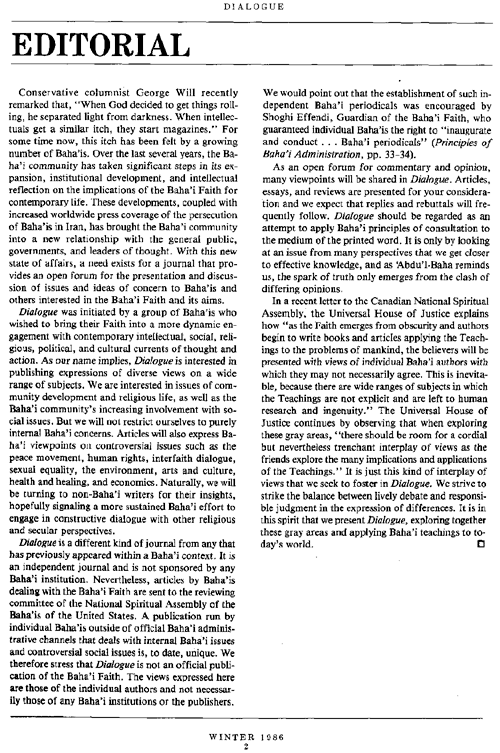 click for larger image |
Letters, from dialogue 1:2, pp. 2, 4-6 (1986) |
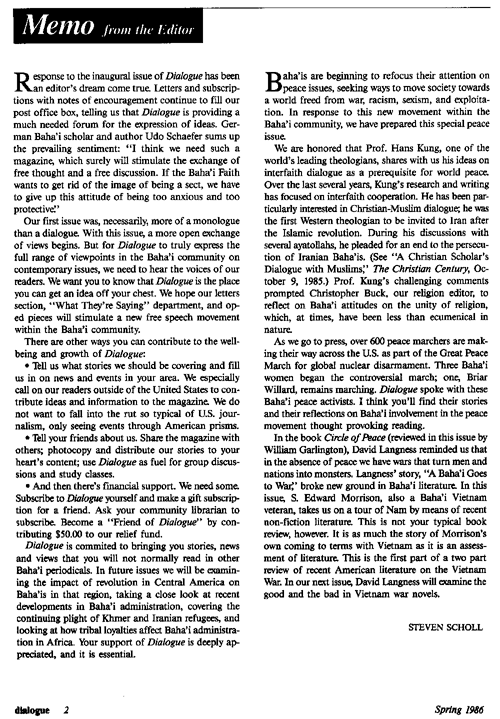 click for larger image |
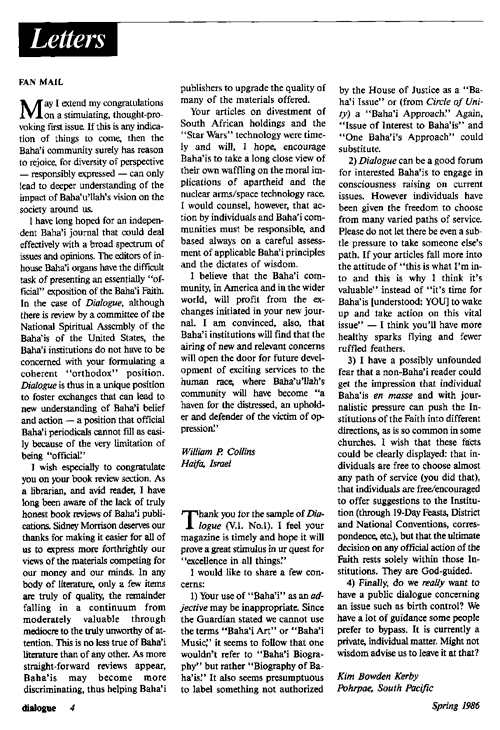 click for larger image |
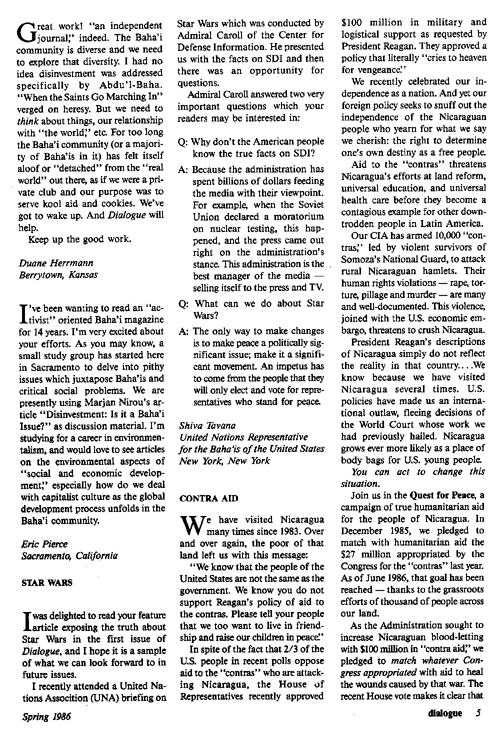 click for larger image |
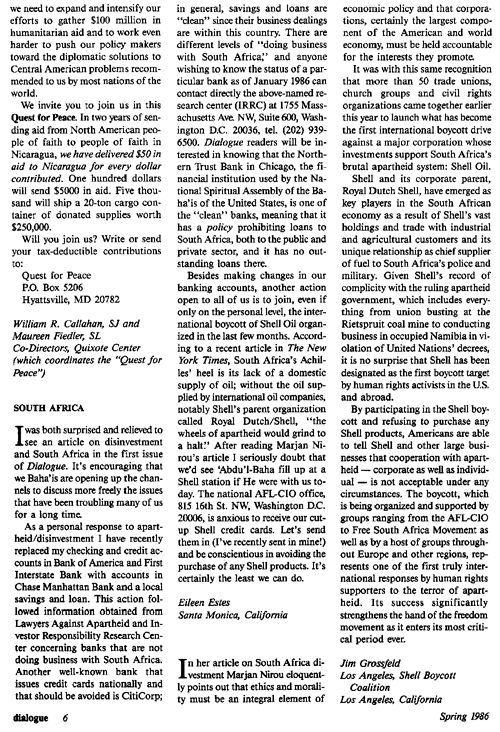 click for larger image |
Letters, from dialogue 1:3, pp. 6-8 (1986) |
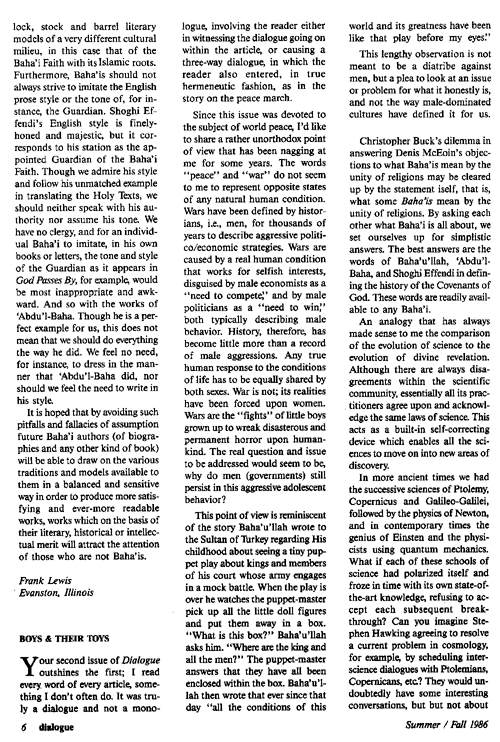 click for larger image |
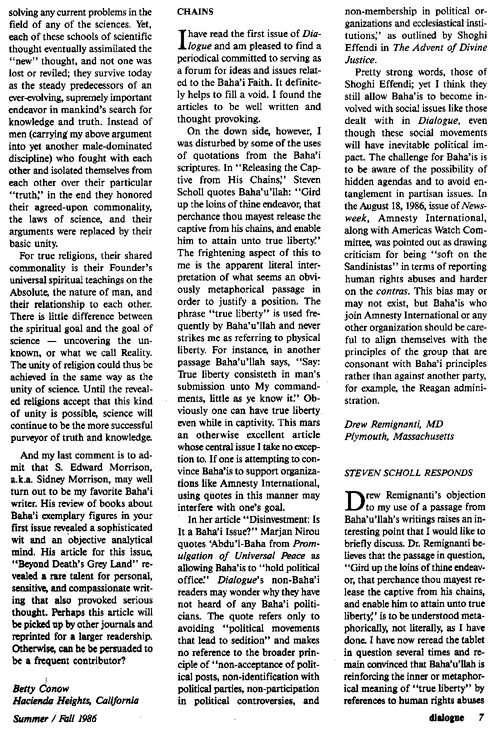 click for larger image |
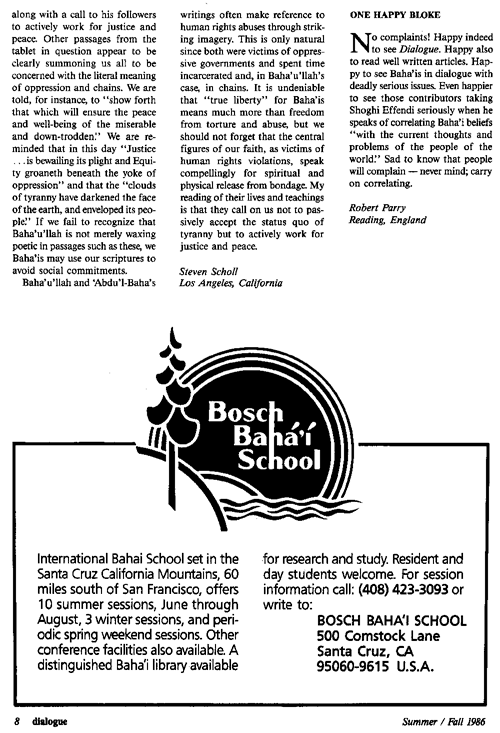 click for larger image |
Letters, from dialogue 1:4, pp. 2, 7 (1987) |
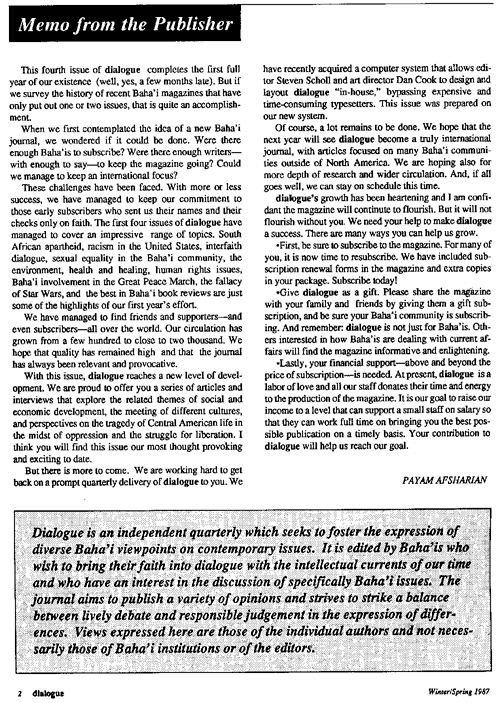 click for larger image |
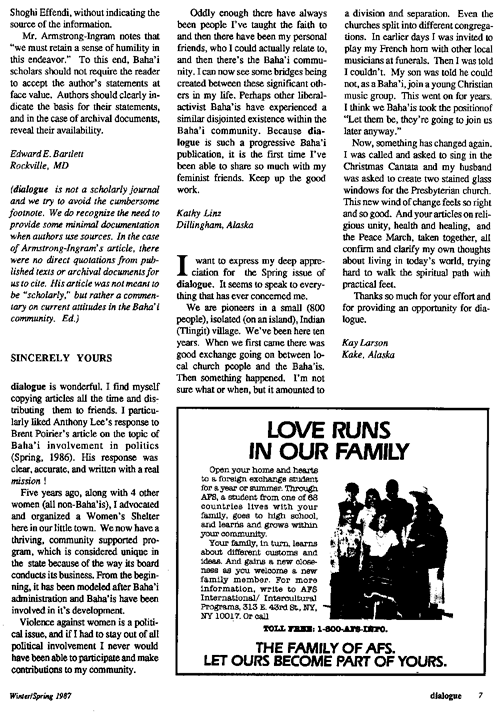 click for larger image |
Letters, from dialogue 2:1, pp. 4-7, 48 (1987) |
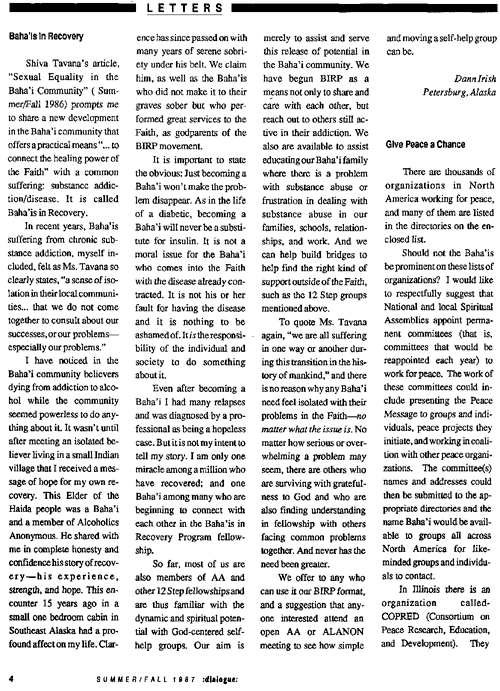 click for larger image |
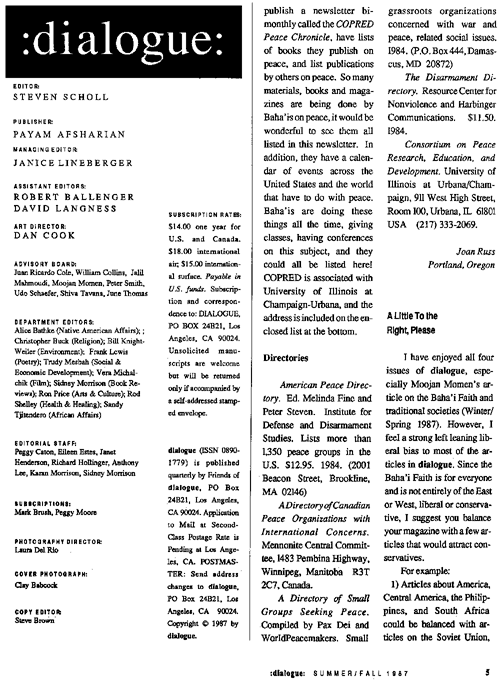 click for larger image |
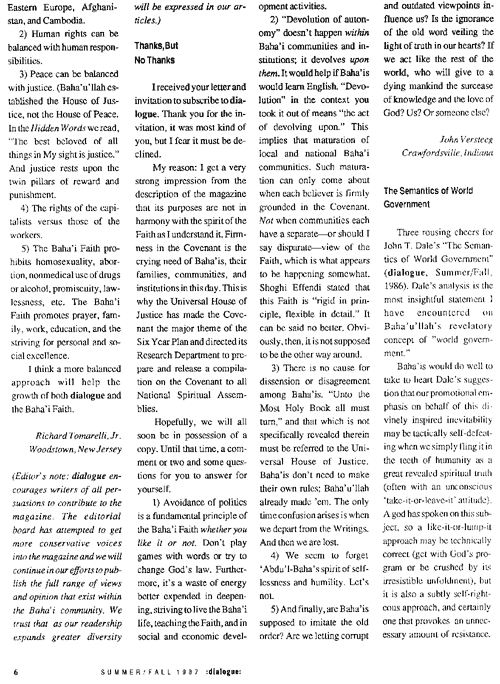 click for larger image |
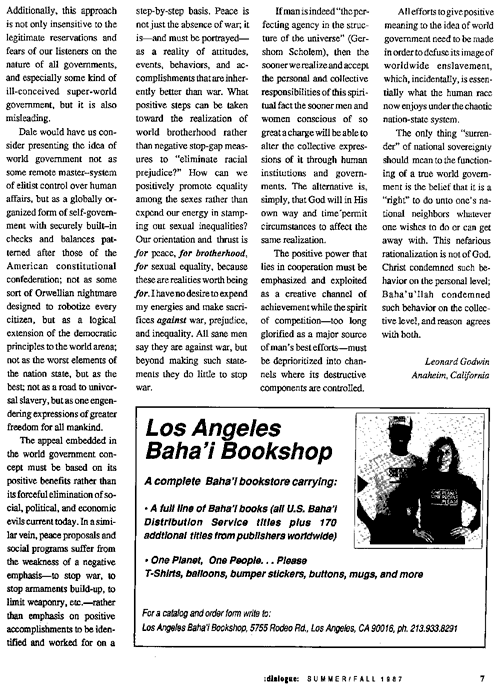 click for larger image |
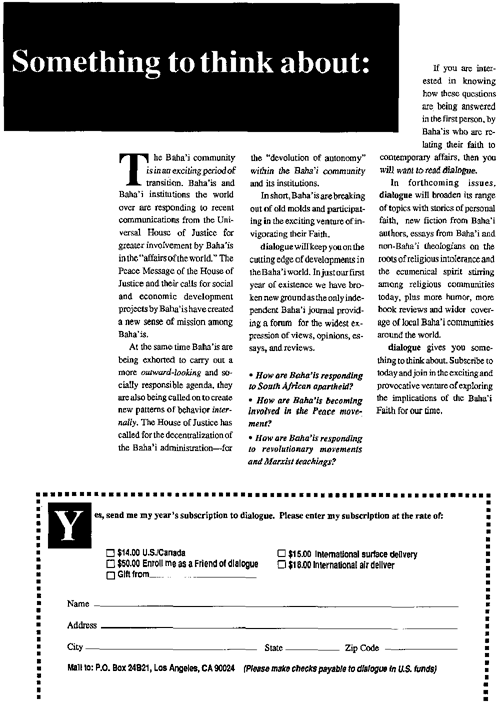 click for larger image |
Letters, from dialogue 2:2-3, p. 5 (1988) |
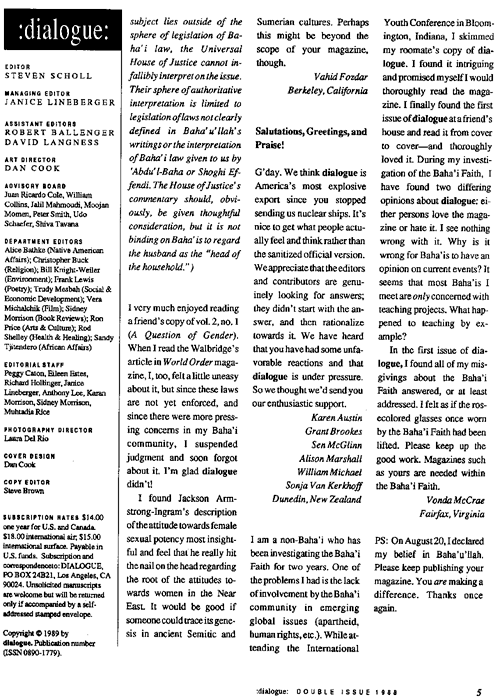 click for larger image |
|
|